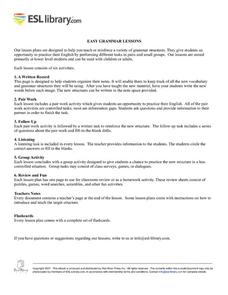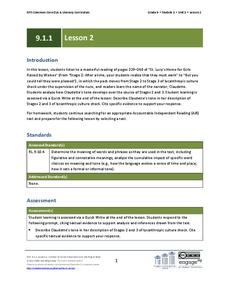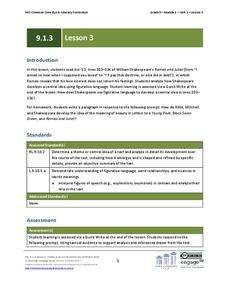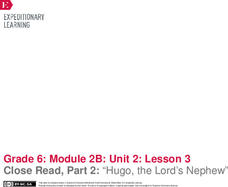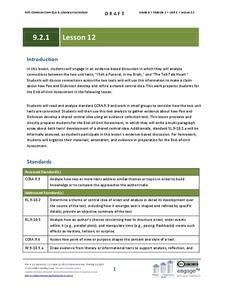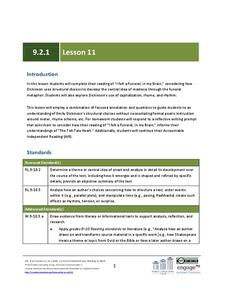EngageNY
Understanding Douglass’s Words: An Escape Attempt
Make a match! Scholars play a matching game after looking at excerpt five from Narrative of the Life of Frederick
Douglass. Learners match types of figurative language with example sentences, and add to their powerful language word wall...
Curated OER
Simile and Metaphor
Middle schoolers use context clues to find the figurative meaning of similes and metaphors in writing. They practice using figurative language to help their writing come alive. Use this activity in a lesson about poetry, figurative...
Houghton Mifflin Harcourt
Give It All You’ve Got!: English Language Development Lessons (Theme 2)
Go beyond the textbook to gain a better appreciation for the English language. A series of ESL lessons help expand the concepts found in Theme 2: Give It All You've Got. The second lesson in a three-part unit incorporates strategies such...
Poetry4kids
How to Write an Exaggeration Poem
The best poetry writing lesson of all time is here for you! Learn all about the art of exaggeration with a lesson on exaggeration poems, which instructs students to use wild imagery to convey their message.
Curated OER
ESL Grammar Lessons
Practice makes perfect when it comes to learning grammar with this ESL resource. Offering a great way to teach about relative clauses, this lesson engages students with a series of partner, small group, and whole class speaking and...
EngageNY
Grade 9 ELA Module 1, Unit 1, Lesson 2
How can you read a character's tone? What about a narrator's tone? Analyze Karen Russell's "St. Lucy's Home for Girls Raised by Wolves" with a lesson that focuses on how word choice can change tone and how tone can affect the development...
K20 LEARN
Brushstrokes: Communication/Using Descriptive Language
Sometimes a picture reflects a thousand descriptive words. To illustrate the importance of sensory words in descriptive writing, scholars listen to a song and craft a painting in response. After sharing their work with the class,...
Curated OER
Lots of Lessons from Aesop
Aesop’s Fables offer young learners an opportunity to study figurative language. After reviewing theme, simile, alliteration, and metaphor, model for your pupils how to identify examples of these devices in the fable. Class members then...
EngageNY
Analyzing Images and Language: Inferring about the Natural Disaster in Eight Days
Pictures often reveal different meanings. Scholars analyze the images in Eight Days and discuss how they add meaning to the text. Readers answers questions about how specific colors are used to create different emotions. Learners then...
Curated OER
Figurative and literal language through the study of Shakespeare
Sixth graders explore figurative and literal language. They study literary devices through short pieces of Shakespeare's work. Then investigate Shakespeare's works and life.
EngageNY
Grade 11 ELA Module 2: Unit 1, Lesson 10
What are you implying? Scholars look at paragraphs eight and nine of the chapter "Of Our Spiritual Strivings" to determine the implications of Du Bois's use of metaphors. In groups, readers discuss the use of metaphors and add their...
EngageNY
Grade 9 ELA Module 1: Unit 3, Lesson 3
Class members listen to a masterful reading of Act 1, Scene 1, lines 203-236 of Romeo and Juliet and then break into groups to examine how Shakespeare uses figurative language to develop Romeo's idealized concept of beauty.
Curated OER
Lesson 1: Figurative Language
The story Once in a Blue Moon by Nicola Morgan is full of figurative language. Second graders choose one idiom from the story and create an illustration of its meaning. Handouts and structured vocabulary practice is included with the...
Curated OER
Metaphors
Students identify metaphors. In this figurative language lesson, students learn about metaphors and listen to various examples. Students read a story and identify the metaphors present. Students complete a worksheet where they...
EngageNY
Close Read, Part 2: “Hugo, the Lord’s Nephew”
No, not literally. Scholars read Hugo, the Lord’s Nephew to compare figurative and literal language. Readers learn about simile, metaphor, personification, and idioms with a graphic organizer. Pupils then answer text-dependent questions...
California Education Partners
Eleven
It is difficult to articulate how growing up feels as accurately and beautifully as Sandra Cisneros does in her short story "Eleven." After seventh graders read the story and note the author's use of figurative language, they respond to...
Common Sense Media
The Masque of the Red Death
Poe goes high tech with a lesson that asks high schoolers to use the internet and various apps as they read and analyze "The Masque of the Red Death." In addition to responding to comprehension questions in Quizlet, they use Minecraft to...
Curated OER
Reading Poetry in the Middle Grades
Bring the beauty of "Nothing Gold Can Stay" by Robert Frost to middle school language arts. After learners read a copy of the poem, they follow an instructional sequence that focuses on sound, figurative language, and theme.
Curated OER
Lesson Plan: Sensory Exploration
Using their keen eyes and ears, learners build story observation skills which they will use to create sensory detail in their art. They note all of the things they observed on a walk, categorize them by sense, and then use the same skill...
EngageNY
Grade 9 ELA Module 2: Unit 1, Lesson 12
What happens when a tenuous grasp on sanity begins to slip? Compare Edgar Allan Poe's "The Tell-Tale Heart" and Emily Dickinson's "I Felt a Funeral, in my Brain" with a lesson plan focused on developing a common central idea. High...
EngageNY
Grade 11 ELA Module 2: Unit 2, Lesson 6
How did the women's rights movement create a ripple effect, improving the lives of future generations? Scholars read and analyze paragraphs 11-12 of "An Address by Elizabeth Cady Stanton," in which the author emphasizes the importance of...
EngageNY
Grade 11 ELA Module 2: Unit 1, Lesson 17
Scholars enter the midpoint of the unit and connect all the previous 16 lessons about the text "Of Our Spiritual Strivings." They complete a Mid-Unit Assessment that requires a multi-paragraph response to a writing prompt.
EngageNY
Grade 9 ELA Module 2: Unit 1, Lesson 11
The capitalization rules are strict and inflexible—until you experience the fluid beauty of an Emily Dickinson poem. Ninth graders test their existing knowledge of language arts conventions with the many bent grammar rules in "I Felt a...
Curated OER
Identifying Figurative Language
Students explore figurative language. In this Fahrenheit 451 activity, students read the Bradbury novel. As they read, students note the simile, metaphor, and personification examples that they encounter.






